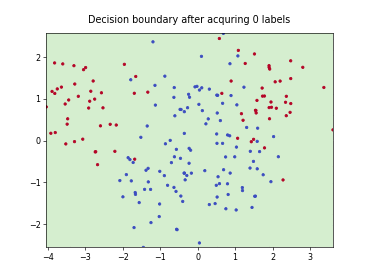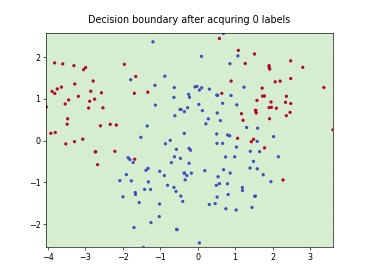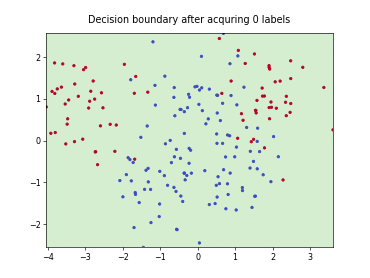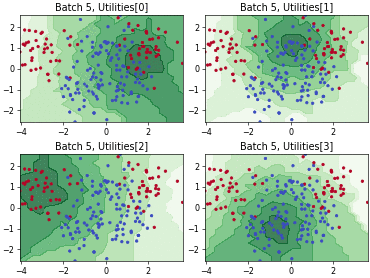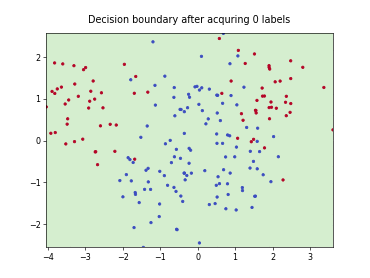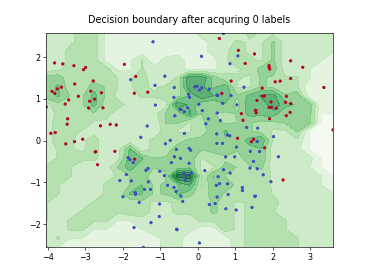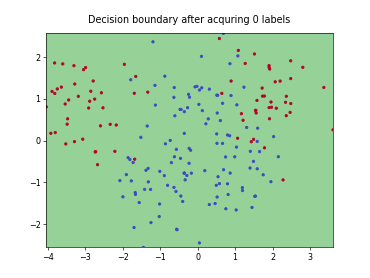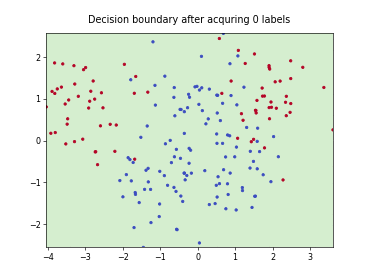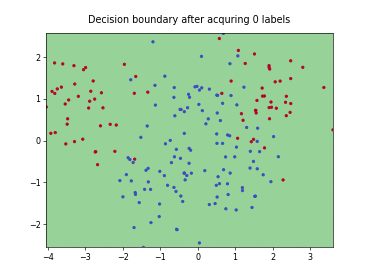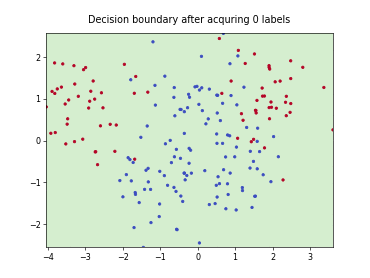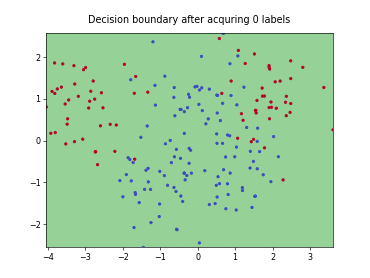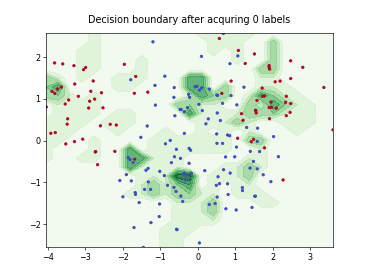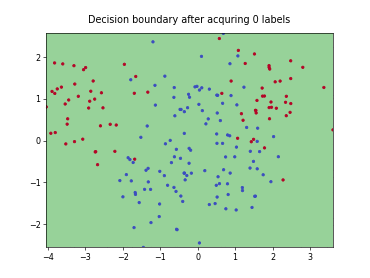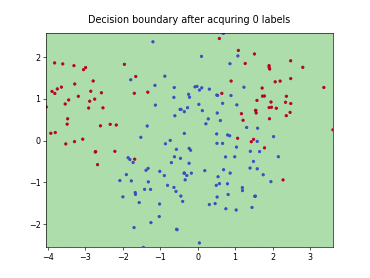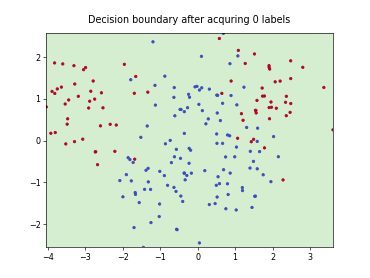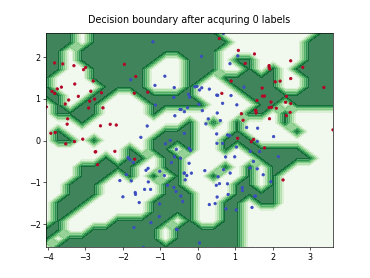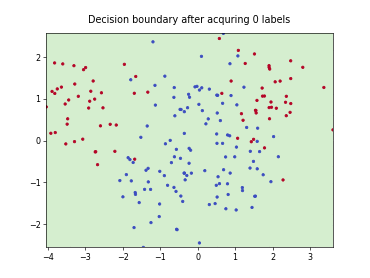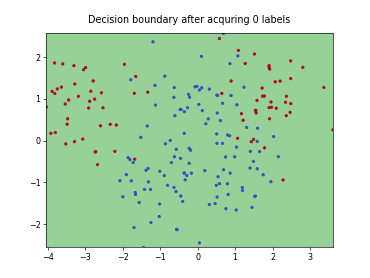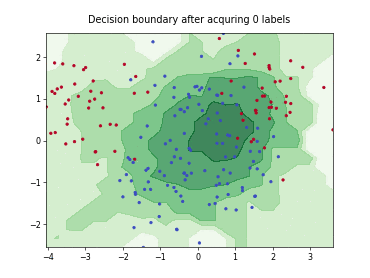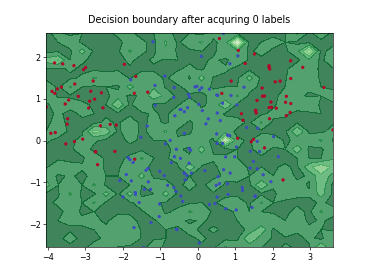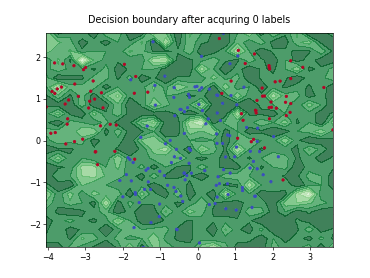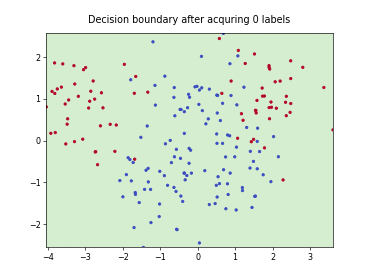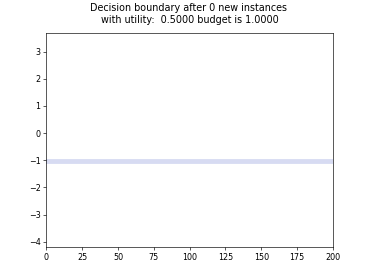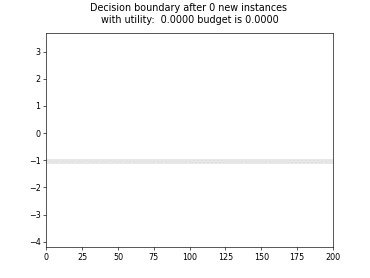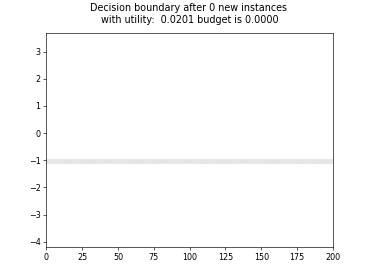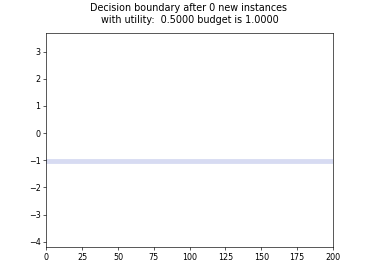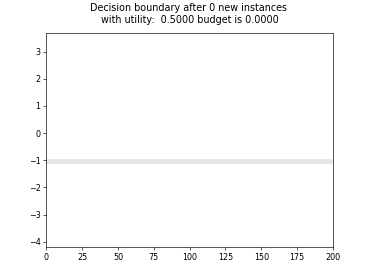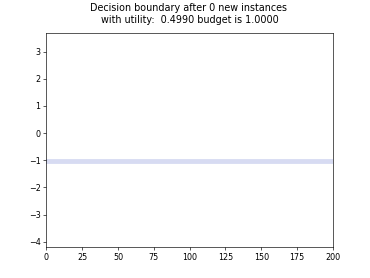skactiveml.classifier.ParzenWindowClassifier#
- class skactiveml.classifier.ParzenWindowClassifier(n_neighbors=None, metric='rbf', metric_dict=None, classes=None, missing_label=nan, cost_matrix=None, class_prior=0.0, random_state=None)[source]#
Bases:
ClassFrequencyEstimatorThe Parzen window classifier (PWC) is a simple and probabilistic classifier. This classifier is based on a non-parametric density estimation obtained by applying a kernel function.
- Parameters
- classesarray-like of shape (n_classes), default=None
Holds the label for each class. If none, the classes are determined during the fit.
- missing_labelscalar or string or np.nan or None, default=np.nan
Value to represent a missing label.
- cost_matrixarray-like of shape (n_classes, n_classes), default=None
Cost matrix with cost_matrix[i,j] indicating cost of predicting class classes[j] for a sample of class classes[i]. Can be only set, if classes is not none.
- class_priorfloat or array-like of shape (n_classes,), default=0
Prior observations of the class frequency estimates. If class_prior is an array, the entry class_prior[i] indicates the non-negative prior number of samples belonging to class classes_[i]. If class_prior is a float, class_prior indicates the non-negative prior number of samples per class.
- metricstr or callable, default=’rbf’
The metric must be a valid kernel defined by the function sklearn.metrics.pairwise.pairwise_kernels.
- n_neighborsint or None, default=None
Number of nearest neighbours. Default is None, which means all available samples are considered.
- metric_dictdict, default=None
Any further parameters are passed directly to the kernel function. For the kernel ‘rbf’ we allow the use of mean kernel [2] and use it when gamma is set to ‘mean’ (i.e., {‘gamma’: ‘mean’}). While N is defined as the labeled data the variance is calculated over all X.
- random_stateint or RandomState instance or None, default=None
Determines random number for ‘predict’ method. Pass an int for reproducible results across multiple method calls.
References
- 1
O. Chapelle, “Active Learning for Parzen Window Classifier”, Proceedings of the Tenth International Workshop Artificial Intelligence and Statistics, 2005.
- 2
Chaudhuri, A., Kakde, D., Sadek, C., Gonzalez, L., & Kong, S., “The Mean and Median Criteria for Kernel Bandwidth Selection for Support Vector Data Description” IEEE International Conference on Data Mining Workshops (ICDMW), 2017.
- Attributes
- classes_array-like of shape (n_classes,)
Holds the label for each class after fitting.
- class_priornp.ndarray of shape (n_classes)
Prior observations of the class frequency estimates. The entry class_prior_[i] indicates the non-negative prior number of samples belonging to class classes_[i].
- cost_matrix_np.ndarray of shape (classes, classes)
Cost matrix with cost_matrix_[i,j] indicating cost of predicting class classes_[j] for a sample of class classes_[i].
- X_np.ndarray of shape (n_samples, n_features)
The sample matrix X is the feature matrix representing the samples.
- V_np.ndarray of shape (n_samples, classes)
The class labels are represented by counting vectors. An entry V[i,j] indicates how many class labels of classes[j] were provided for training sample X_[i].
Methods
fit(X, y[, sample_weight])Fit the model using X as training data and y as class labels.
Get metadata routing of this object.
get_params([deep])Get parameters for this estimator.
predict(X)Return class label predictions for the test samples X.
predict_freq(X)Return class frequency estimates for the input samples 'X'.
Return probability estimates for the test data X.
sample_proba(X[, n_samples, random_state])Samples probability vectors from Dirichlet distributions whose parameters alphas are defined as the sum of the frequency estimates returned by predict_freq and the class_prior.
score(X, y[, sample_weight])Return the mean accuracy on the given test data and labels.
set_fit_request(*[, sample_weight])Request metadata passed to the
fitmethod.set_params(**params)Set the parameters of this estimator.
set_score_request(*[, sample_weight])Request metadata passed to the
scoremethod.Attributes
- METRICS = ['additive_chi2', 'chi2', 'cosine', 'linear', 'poly', 'polynomial', 'rbf', 'laplacian', 'sigmoid', 'precomputed']#
- fit(X, y, sample_weight=None)[source]#
Fit the model using X as training data and y as class labels.
- Parameters
- Xarray-like of shape (n_samples, n_features)
The sample matrix X is the feature matrix representing the samples.
- yarray-like of shape (n_samples)
It contains the class labels of the training samples.
- sample_weightarray-like of shape (n_samples), default=None
It contains the weights of the training samples’ class labels. It must have the same shape as y.
- Returns
- self: ParzenWindowClassifier,
The ParzenWindowClassifier is fitted on the training data.
- get_metadata_routing()#
Get metadata routing of this object.
Please check User Guide on how the routing mechanism works.
- Returns
- routingMetadataRequest
A
MetadataRequestencapsulating routing information.
- get_params(deep=True)#
Get parameters for this estimator.
- Parameters
- deepbool, default=True
If True, will return the parameters for this estimator and contained subobjects that are estimators.
- Returns
- paramsdict
Parameter names mapped to their values.
- predict(X)#
Return class label predictions for the test samples X.
- Parameters
- Xarray-like of shape (n_samples, n_features)
Input samples.
- Returns
- ynumpy.ndarray of shape (n_samples)
Predicted class labels of the test samples X. Classes are ordered according to classes_.
- predict_freq(X)[source]#
Return class frequency estimates for the input samples ‘X’.
- Parameters
- X: array-like or shape (n_samples, n_features) or shape (n_samples, m_samples) if metric == ‘precomputed’
Input samples.
- Returns
- F: array-like of shape (n_samples, classes)
The class frequency estimates of the input samples. Classes are ordered according to classes_.
- predict_proba(X)#
Return probability estimates for the test data X.
- Parameters
- Xarray-like, shape (n_samples, n_features) or
- shape (n_samples, m_samples) if metric == ‘precomputed’
Input samples.
- Returns
- Parray-like of shape (n_samples, classes)
The class probabilities of the test samples. Classes are ordered according to classes_.
- sample_proba(X, n_samples=10, random_state=None)#
Samples probability vectors from Dirichlet distributions whose parameters alphas are defined as the sum of the frequency estimates returned by predict_freq and the class_prior.
- Parameters
- Xarray-like of shape (n_test_samples, n_features)
Test samples for which n_samples probability vectors are to be sampled.
- n_samplesint, default=10
Number of probability vectors to sample for each X[i].
- random_stateint or numpy.random.RandomState or None, default=None
Ensure reproducibility when sampling probability vectors from the Dirichlet distributions.
- Returns
- Parray-like of shape (n_samples, n_test_samples, n_classes)
There are n_samples class probability vectors for each test sample in X. Classes are ordered according to classes_.
- score(X, y, sample_weight=None)#
Return the mean accuracy on the given test data and labels.
- Parameters
- Xarray-like of shape (n_samples, n_features)
Test samples.
- yarray-like of shape (n_samples,)
True labels for X.
- sample_weightarray-like of shape (n_samples,), default=None
Sample weights.
- Returns
- scorefloat
Mean accuracy of self.predict(X) regarding y.
- set_fit_request(*, sample_weight: Union[bool, None, str] = '$UNCHANGED$') ParzenWindowClassifier#
Request metadata passed to the
fitmethod.Note that this method is only relevant if
enable_metadata_routing=True(seesklearn.set_config()). Please see User Guide on how the routing mechanism works.The options for each parameter are:
True: metadata is requested, and passed tofitif provided. The request is ignored if metadata is not provided.False: metadata is not requested and the meta-estimator will not pass it tofit.None: metadata is not requested, and the meta-estimator will raise an error if the user provides it.str: metadata should be passed to the meta-estimator with this given alias instead of the original name.
The default (
sklearn.utils.metadata_routing.UNCHANGED) retains the existing request. This allows you to change the request for some parameters and not others.New in version 1.3.
Note
This method is only relevant if this estimator is used as a sub-estimator of a meta-estimator, e.g. used inside a
Pipeline. Otherwise it has no effect.- Parameters
- sample_weightstr, True, False, or None, default=sklearn.utils.metadata_routing.UNCHANGED
Metadata routing for
sample_weightparameter infit.
- Returns
- selfobject
The updated object.
- set_params(**params)#
Set the parameters of this estimator.
The method works on simple estimators as well as on nested objects (such as
Pipeline). The latter have parameters of the form<component>__<parameter>so that it’s possible to update each component of a nested object.- Parameters
- **paramsdict
Estimator parameters.
- Returns
- selfestimator instance
Estimator instance.
- set_score_request(*, sample_weight: Union[bool, None, str] = '$UNCHANGED$') ParzenWindowClassifier#
Request metadata passed to the
scoremethod.Note that this method is only relevant if
enable_metadata_routing=True(seesklearn.set_config()). Please see User Guide on how the routing mechanism works.The options for each parameter are:
True: metadata is requested, and passed toscoreif provided. The request is ignored if metadata is not provided.False: metadata is not requested and the meta-estimator will not pass it toscore.None: metadata is not requested, and the meta-estimator will raise an error if the user provides it.str: metadata should be passed to the meta-estimator with this given alias instead of the original name.
The default (
sklearn.utils.metadata_routing.UNCHANGED) retains the existing request. This allows you to change the request for some parameters and not others.New in version 1.3.
Note
This method is only relevant if this estimator is used as a sub-estimator of a meta-estimator, e.g. used inside a
Pipeline. Otherwise it has no effect.- Parameters
- sample_weightstr, True, False, or None, default=sklearn.utils.metadata_routing.UNCHANGED
Metadata routing for
sample_weightparameter inscore.
- Returns
- selfobject
The updated object.
Examples using skactiveml.classifier.ParzenWindowClassifier#

Batch Active Learning by Diverse Gradient Embedding (BADGE)
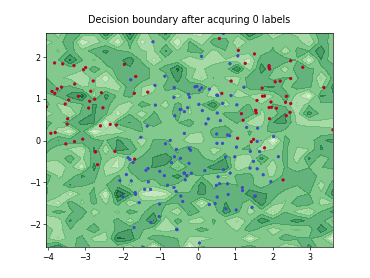
Query-by-Committee (QBC) with Kullback-Leibler Divergence
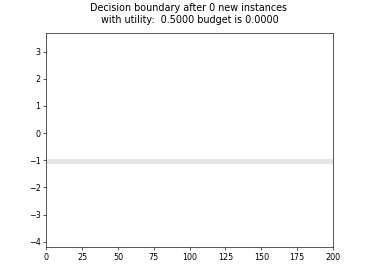
Cognitive Dual-Query Strategy with Random Sampling
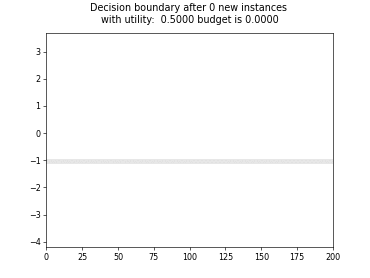
Cognitive Dual-Query Strategy with Fixed-Uncertainty
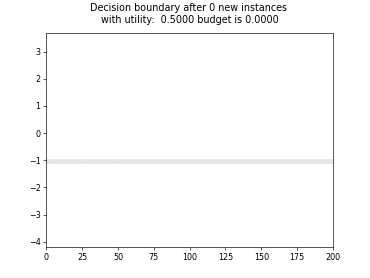
Cognitive Dual-Query Strategy with Variable-Uncertainty
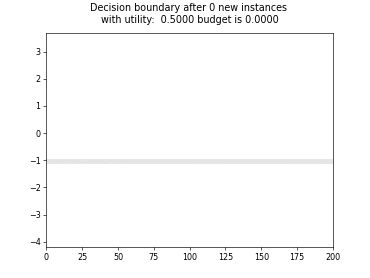
Cognitive Dual-Query Strategy with Randomized-Variable-Uncertainty
